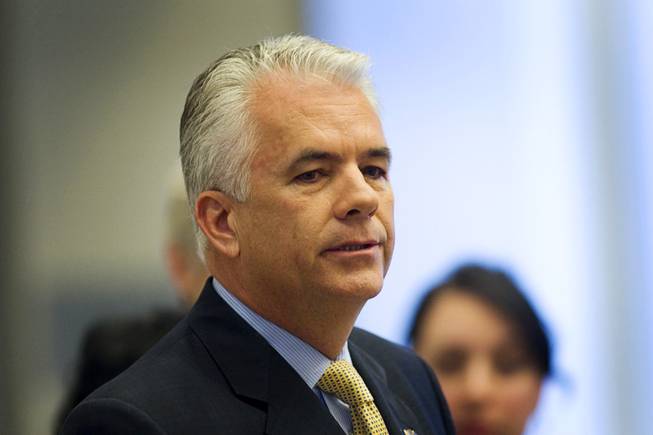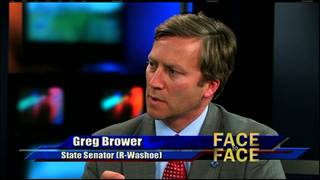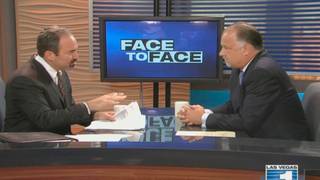
John Ensign announces he will not seek another term during a news conference at the Lloyd George Federal Building in Las Vegas on Monday, March 7, 2011.
Published Thursday, May 12, 2011 | 9:25 a.m.
Updated Thursday, May 12, 2011 | 3:37 p.m.
Committee Report
Ethics report
Sun reporter Karoun Demirjian talks to KSNV about the Senate Ethics Committee report on former Sen. John Ensign, May 12, 2011.
Face to Face

Viewing video requires the latest version of Adobe's Flash Player
Sun Archives
- Dean Heller sworn in as U.S. senator (5-9-11)
- John Ensign poses for pictures, keeps low profile as 16-year run nears end (4-28-11)
- Sandoval chooses Dean Heller for John Ensign replacement (4-27-11)
- Until the end, John Ensign a master of close-call politics (4-22-11)
- Heller appointment to Senate changes campaign calculus (4-22-11)
- Dean Heller could get boost, but can't shake bout with Shelley Berkley (4-22-11)
- If Dean Heller chosen to replace John Ensign, fallout would be felt down the ticket (4-22-11)
- Sandoval: Sen. John Ensign replacement will be named before May 3 (4-22-11)
Resignation Letter
Ensign Timeline
Sun Coverage
Beyond the Sun
- Politico: John Ensign report filled with bombshells
- The Wall Street Journal: Senate Panel Finds Wrongdoing By Ensign; Refers Case To DOJ
- The Hill: Senate report: Santorum emailed Ensign that affair could be made public
- The Washington Post: Senate ethics committee: Ensign violated federal laws
- The New York Times:Ethics panel asks that Ensign inquiry be reopened
Doug Hampton interview - July 2009

Viewing video requires the latest version of Adobe's Flash Player
Doug Hampton interview, part 2 - July 2009

Viewing video requires the latest version of Adobe's Flash Player
WASHINGTON - He may be gone from the Senate, but John Ensign hasn’t been forgotten.
Senate Ethics Committee members announced Thursday they had voted unanimously to release the committee’s final report about their investigation into Ensign’s actions surrounding and stemming from his affair with a campaign staffer, and refer their findings to the Justice Department and Federal Elections Commission.
"We have reason to believe that Senator Ensign violated laws within their jurisdictions," said committee Chairwoman Barbara Boxer, D-Calif. “These findings are so disturbing ... that had Senator Ensign not resigned, and had we been able to proceed to that adjudication, that the evidence of Senator Ensign’s wrongdoing would have been substantial enough to warrant the consideration of expulsion, the harshest penalty available to the committee and the Senate.
“That’s why when former Senator Ensign resigned, the vice chairman and I put out a statement, and we said the he made, quote, ‘the appropriate decision,'” Boxer said.
“No one in public office volunteers for the type of responsibilities that we have had in the case of Senator Ensign, but all of us took that responsibility when it came upon us,” said committee Vice Chairman Johnny Isakson, R-Ga. “As sad as the deliberations were and the ultimate result was, it was proof that this Senate and its Ethics Committee can stand up and do the effort necessary to see to it this institution’s integrity proceeds in the future, uninhibited and unendangered.”
The committee’s report is the culmination of a 22 month-long investigation, in which the committee deposed or interviewed 72 witnesses, issued 32 subpoenas for documents and reviewed more than 500,000 documents. It was written under the direction of Carol Elder Bruce, who was appointed to serve as special counsel on the Ensign investigation in early February.
The report is 75 pages, but the heart of it boils down to eight essential findings based on “substantial, credible evidence” that Boxer read on the Senate floor, reprinted here as they were read:
1. that Ensign conspired to violate Doug Hampton’s post-employment contact plan.
2. that Ensign aided and abetted Doug Hampton’s violation of the post-employment contact ban.
3. that Ensign made false and misleading statements to the Federal Election Commission regarding the $96,000 payment made to the Hamptons.
4. that the $96,000 payment to Hampton violated federal campaign finance laws.
5. that Ensign violated a law and a Senate rule prohibiting unofficial office accounts.
6. that Ensign permitted spoilation of documents and engaged in potential obstruction of justice.
7. that Ensign discriminated on the basis of gender.
8. that Ensign engaged in improper conduct reflecting on the Senate, including violating his own office policies written in a manual.
“When Senator Ensign resigned, he said, and I quote: ‘I have not violated any law, any rule or a standard of conduct.’ I want to go on record as Chairman of the Ethics committee to say how strongly I disagree with that statement,” Boxer said.
“This committee believes every senator should read this report very carefully because it is a cautionary tale,” she continued. “It shows that our actions, all of them, have consequences for ourselves, for our families, for our staffs, for Congress and for our nation ... and in my view, my own personal view, it shows something else.
“And that is when you are in a position of trust and power, don’t abuse it. Don’t misuse it. Because people can get hurt,” she said. “Very, very hurt.”
The release of the report brings the Senate Ethics Committee's investigation to a close.
Lawyers for Ensign said "he is confused and disappointed" that the committee released its report on the same day they said they delivered a submission to the committee that ought to have been considered.
"Given his resignation and announcement that he was not running for re-election, there does not seem to be any real reason for a rush to create a report that did not fully consider our submission and which did not allow us to follow up on any remaining issues," wrote attorneys Robert L. Walker and Abbe D. Lowell of Wiley Rein, LLP, a Washington D.C. law firm representing Ensign.
"Senator Ensign has admitted and apologized for his conduct and imposed on himself the highest sanction of resignation," they added. "But this is not the same as agreeing that he did or intended to violate any laws or rules, and this submission demonstrates that there is a lot more to the issues than the Committee's report indicates."
Paul Coggins, an attorney with the Dallas firm of Fish & Richardson, which is also representing Ensign, added Thursday that he was "confident that the Department of Justice will conclude that Senator Ensign fully complied with the law."
It remains to be seen what the Justice Department and the Federal Elections Commission will do with the recommendation that they pursue legal action against Ensign on the basis of the Ethics Committee's report. Both the DOJ and the FEC were investigating Ensign previously, but elected to close their investigations at the end of last year.
Ensign's lawyers and his Senate office, which is still winding down its operations, did not immediately return requests for comment Wednesday afternoon.
Ensign has been dodging public scrutiny since mid-June 2009, when he announced that he had been having an affair with a campaign staffer, Cynthia Hampton -- who was the wife of his chief of staff, Doug Hampton.
The Hamptons no longer work for Ensign; shortly after the revelation of the affair, Ensign's parents paid their family $96,000, and Ensign helped Doug Hampton get a job as a lobbyist. That didn't go so well for him in the long term: Doug Hampton was recently indicted in a federal court in Washington, D.C., for allegedly breaking Congress' sunset laws on lobbying, which say that a former congressional staffer must wait at least a year before they begin to lobby Congress. He didn't.
The Ethics Committee's investigation is the most severe legal sanction Ensign has faced for his actions, although that may worsen if the Justice Department reopens its investigation. Justice Department charges, if they stick, can carry fines and/or jail time.
To date, Ensign's punishments have been political.
Two years ago, Ensign was a star ascendant in the GOP. His name was even being tossed around to make a potential dark horse presidential bid to challenge Obama in 2012.
Those aspirations were dashed in the aftermath of his affair, but it's only been in recent months that the real political price of his scandal has become clear.
Even after the Justice Department and the FEC dropped their investigations of him, the Senate ethics panel kept ramping up -- and, it appears, so did the political pressure on Ensign to step aside. In March, he announced that he would not be seeking to retain his seat in 2012, calling off a re-election campaign that was already months underway. Then last month, he announced that he'd be resigning the Senate, effective May 3. Gov. Brian Sandoval appointed now-former Second Congressional District Rep. Dean Heller to fill the seat; Heller was sworn in as Nevada's 25th U.S. senator on Monday.
Ensign was scheduled to be deposed by Ethics committee investigators on May 4th and 5th, hence, the effective date of his resignation. It would have been the final deposition in the Ethics Committee's investigation.
Even after Ensign's departure, the Ethics Committee was not required to investigate Ensign. But the ultimate sanction available to the committee, if it did launch official charges and find Ensign guilty, is recommending an impeachment trial in which the Senate might vote to oust him from the body. While there's still something to be said for the weight of such a censure -- and it appears the committee believes such a censure would have been warranted -- the process would have been both expensive and pragmatically moot, since Ensign already left his Senate seat.
The Senate Ethics Committee is a six-person, bipartisan panel, equally weighted between Democrats and Republicans. In addition to Chairman Boxer and Vice-Chairman Isakson, the senators who voted unanimously to recommend the release of the report and the recommendation for legal action to the DOJ were Democratic Sens. Ben Cardin of Maryland and Sherrod Brown of Ohio, and Republicans Pat Roberts of Kansas and Jim Risch of Idaho. Cardin, Brown, and Roberts joined Boxer and Isakson to announce the committees final censure of Ensign on the Senate floor.
A spokesman for Senate Majority Leader Harry Reid, who represented Nevada in the Senate along with Ensign for the entirety of the former Senator's decade-long tenure in the body, said the senator would not be commenting on the Ethics Committee's report.



Join the Discussion:
Check this out for a full explanation of our conversion to the LiveFyre commenting system and instructions on how to sign up for an account.
Full comments policy